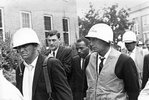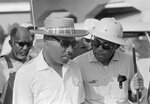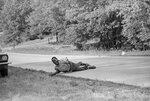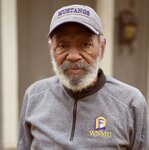



James Meredith challenged Mississippi’s racial order and paved the way for integration nationwide. His path down the road of affecting change on a national scale all began in the clerical/typist program at Western New Mexico University.
On Sept. 30, 1962, in an evening address to the nation, President John F. Kennedy announced, “Mr. James Meredith is now in residence on the campus of the University of Mississippi,” a culmination following days of rioting, looting and the dispatch of nearly 20,000 U.S. troops and Marshals, who were ordered to uphold Meredith’s constitutional rights, when the governor, school leadership and local law enforcement failed in that charge.
Following his history-making actions that led to the desegregation of Ole Miss, Meredith set out to march 220 miles for voting rights and prove a black man could walk peacefully from Memphis, Tennessee, to Jackson, Mississippi. On the second day of his March Against Fear, Meredith was struck down by the bullet of a would-be assassin. While he recovered, his demonstration was resumed by civil rights leaders, including Dr. Martin Luther King Jr., and the Student Non-Violent Coordinating Committee’s Stokely Carmichael, the latter introducing the idea of Black Power to a broad audience during the walk. In Jackson, Meredith rejoined the estimated 15,000 who took up the march in his stead, leading to a concluding rally at the state capitol.
Having earned a law degree from Colombia University, Meredith ran for political office and became a political advisor. He has penned more than two dozen books, including his memoir “Three Years in Mississippi.” Most recently, he was the subject of a BBC documentary that aired on the Smithsonian Channel.
Learning With Meaning
For Meredith, his path down the road of affecting change on a national scale all began in the clerical/typist program at what is today Western New Mexico University while enlisted in the United States Air Force.
“One of my most powerful memories has always been New Mexico Western College because I’ve always known what it did for me,” he said.
While most see Meredith’s admission to the all-white University of Mississippi as a pivotal moment in civil rights history and what is now considered a landmark U.S. Supreme Court case, Meredith sees his attendance at New Mexico Western College as a pivotal moment in his own personal history.
“Most military people didn’t go to college to learn whatever they were going to do in the military, so I was lucky enough to end up at a college,” he said. Maybe it wasn’t luck. But it shaped me, influenced the rest of my life.”
After basic training, the Air Force sent Meredith to Silver City in the fall of 1951 to train as a clerk/typist.
“The basic training was only six weeks. But from August to January, I was in New Mexico Western College, which was a long time comparatively,” he said.
While the program was called clerk/typist, Meredith said “it was a little more than that in the military.” What the instructors were really teaching was language arts.
“As a result of that training, I became proficient in the English language. In addition to reading a lot of material, I was able to write a lot of material,” he said.
From Mississippi, Meredith had never known a high school teacher who’d earned a college degree.
“The people with that type of education were never considered experts in their language. But New Mexico Western College made me an expert,” he said.
That expertise made him more proficient in reading and writing than his superiors in the military, too.
“It wasn’t just the 18-year-olds who didn’t know much about the English language,” he said. Most of the commanders and sergeants didn’t know much about the English language either, so I had to straighten out most of what they wrote. And I could do that because in the military all your bosses are military people, and at New Mexico Western College, they were all civilians.”
Meredith doesn’t remember being trained in administrative work, as only the English classes stand out in his mind.
“I have written 28 books since then, and I’m almost certain it was because I went to that school,” he said.
Continuing To Dream
After leaving Silver City, Meredith was assigned to a base in Kansas.
“The first thing that I did within a week of being at Topeka Air Force Base was to go to their one-room library and start reading books,” he said. That’s what I did for most of the nine years I was in the military. It might not have been exactly because of my attendance at New Mexico Western College, but I’m sure there was a connection.”
In 2020, Meredith reconnected with WNMU.
“I have not been back but it did seem like Silver City was high up in the hills of the mountains,” he said in one of the initial conversations. And after receiving a photograph of campus in the present day from the WNMU Alumni Association, Meredith exclaimed, “I was right!”
Acknowledging that nearly six decades have passed since he acquired essential skills and knowledge that carried him through an impactful career, Meredith emphasized the part this institution played in his overall course.
“A whole lotta water’s crossed under the bridge, but there’s no question in my mind the role New Mexico Western College played in my good fortune through my life,” he said.